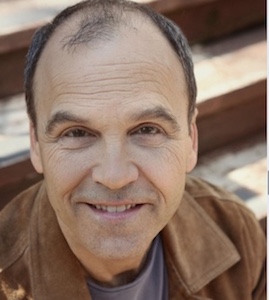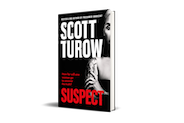
My ambition, even before I reached adolescence, was to be a novelist. That was what my mother hoped for, too, although she never had the time or discipline to pursue that dream actively. And so at some level, I guess I had decided to make her dream mine.
Whatever the reason, that vision had an unrelenting grip on me. Leaving high school, I had declared to anyone who would listen that I was going to write novels. But I knew next to nothing about how to get there. At Amherst College, where I was an undergraduate, there was no creative writing program. When I was sophomore, the college finally hired a writer in residence, Tony Connor, a wonderful poet from Manchester. Tony, when I sought his guidance, was devastatingly honest. “Scoott,” he said in his heavy Mancunian accent, “I know noo-thing about writing noo-vels, but if I wanted to be a noo-velist I would stoof myself with noo-vels.”
Stuffing myself with novels became my plan. But since I was in an academic environment my reading was heavily influenced by my professors’ tastes. In those days, the late 1960’s, the common academic view was that James Joyce was what gets called “the G.O.A.T.” these days on US sport broadcasts—the Greatest of All Times.
I had read Portrait of the Artist as a Young Man with adoration in high school, judging it to be the story of my soul. Now after my sophomore year in college, I decided to take up Ulysses, which many scholars seemed to regard as the greatest novel ever written. That summer, I was working as a substitute mail carrier for the United States Post Office in a small suburban town, north of Chicago. The truth was that being a letter carrier did not require the eight hours labor for which we were paid and thus the plan, rigidly enforced by senior employees, was not to return to the post office early, for fear that the Postmaster might give us more to do.
In town, the only air conditioned building, where I could wait out the time before I could safely return to the P.O., was the public library. And that’s where I read Ulysses, taking the library’s only copy from the shelves for an hour or two every day.
Eventually, I made two discoveries about Ulysses. One was that it was not easy reading. I wasn’t unhappy that I was earning $2.52 for every hour I spent with the novel (which I ultimately finished and hugely admired, but not in the way I’d loved Portrait, which was less of a struggle). The second revelation, which came near the end of the summer, was that the library’s sole copy of what my professors regarded as the Greatest Novel Ever Written was on the shelf every day when I went for it. The town where I was employed was full of highly educated people. Almost everybody had a college degree and many more had been to some form of graduate school. But despite this high level of literacy, no one was competing with me for the chance to read the Greatest Novel Ever Written. How could Ulysses be so amazing if nobody else wanted to read it?
This enigma stayed with me after college when I became a fellow in the Stegner Writing Program at Stanford University. In time I was hired at the lowest faculty level as a lecturer in the English Department. As I struggled with my own work during my five years at Stanford, I was constantly bedeviled by the question of what the novel, as a form, was supposed to be about, which was another way of wondering what I should be writing.
There were influential professors at Stanford who were committed avant-gardists. They felt that literature had to go even further in the experimental directions of Ulysses. One of them, John Hawkes, the American novelist who had taught for a while at Stanford before I got there, had famously declared that “the true enemies of the novel are plot, character, setting and theme.” That never made sense to me. I was more impressed by the observations of Leo Tolstoy, my own candidate for G.O.A.T., who held avant-gardism in contempt, because it rendered fiction utterly impenetrable to most readers. “To say that a work of art is good, but incomprehensible to the majority of [the audience],” Tolstoy said, “is the same as saying of some kind of food that it is very good but that most people can't eat it.” Following Tolstoy, by the time I had left Stanford, I had concluded that the greatest art, and the greatest novels, had to be universal, capable of enlightening and entertaining—as Aristotle said were the purposes of art—virtually everyone.
But I was not sure even the realist novelists, with whom I felt more closely allied, writers like my friend and teacher Wallace Stegner, had fully unlocked the secret either. Because academic fashion in those days abjured most popular fiction, plot was regarded with suspicion. Charles Dickens, or fine contemporary writers like John Le Carré were often looked down upon. By the realist view, coincidence, and experience outside the daily mainstream (like spying) were, by their nature, “unrealistic” and thus not the stuff of proper fiction, which in the realist view wanted to hold a mirror up to life. I understood the point, but there were a lot more people reading Mario Puzo than the high realists like Saul Bellow. Who was closer, therefore, to creating universals?
As I said, I left Stanford and had made the surprising decision to go to law school. I did not want an academic career in English—the fierce sometimes angry debates at Stanford between the avant-gardists and the realists struck me as battles over a postage-stamp size piece of ground. And I also saw the teaching of English increasingly dominated by a view I instinctively rejected, that literature is yet another species of politics.
The law on the other hand seemed to deal with problems I regarded as essential, the fundamental question of what is just. I was especially fascinated by many friends who were working as prosecutors and defense lawyers. Within the criminal law I saw society trying to work out its eternal struggle with transgression within a framework that at least in the lawyer’s view was fair. Yes wrongdoing must be punished, but only after an orderly process whose fundamental aim was finding the truth.
After graduating law school, I was lucky enough to get hired as a federal prosecutor in Chicago, my hometown. That was a consuming job, in part because I felt such importance about standing up for my community’s values against wrongdoers, and such tumult about the law’s insistence that evil be thwarted by means and methods that the legal system thought of as fair. But despite the deep emotional stakes I felt in being a prosecutor, I still tried to save time on the morning commuter train or at home late on Sunday night to write fiction, even though I still had the sense at times that I was looking for my own story.
And then one day, a few years later, I went up to court to watch a couple of new lawyers try a case, so that I could give them pointers. I arrived just as their star witness had taken the stand. It was a minor case, given the magnitude of most of the crimes my office prosecuted. A grocer was being tried for a scheme he’d devised to cash several thousand dollars in stolen food stamps. But despite the smaller nature of the crime, when the star witness spoke everyone in the room was breathless and captivated. The story he was telling, about how people went wrong and did wrong, fascinated every person listening.
As I drew back to myself to notice that, I was struck by the lightning of revelation: this was my subject, crimes. Transgression. Deviation. Detection. Punishment. And the eternal question of why. It was a subject of universal interest and profound inner meaning to me.
I had already started writing Presumed Innocent by then, thinking that I was following the old saw to write about what you knew. But I was suspicious of myself for writing what was turning out to be a mystery, the kind of book my professors regarded as less than literature. For that, and other reasons, I had put the book aside. But now I went back to it with zeal and without apology. It was part of the story seething in the center of me, clamoring to be told.’
 Scott Turow’s new novel Suspect is published in the UK as a £20 hardback by Swift Press on 22 September 2022 (and by Grand Central Publishing in the US on 27 September, $29.00)
Scott Turow’s new novel Suspect is published in the UK as a £20 hardback by Swift Press on 22 September 2022 (and by Grand Central Publishing in the US on 27 September, $29.00)
Photo Credit © Jeremy Lawson